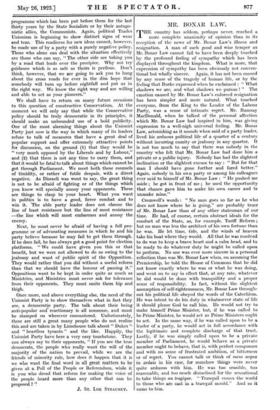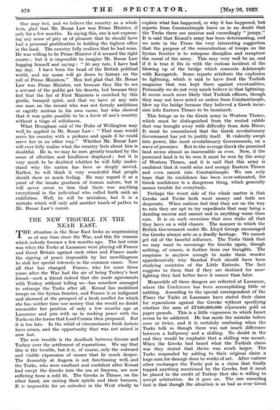MR. BONAR LAW.
THE country has seldom, perhaps never, reached a more complete unanimity of opinion than in its reception of the news of Mr. Bonar Law's illness and resignation. A man of such good and wise temper as Mr. Bonar Law cannot fail to have been deeply touched by the profound feeling of sympathy which has been displayed throughout the kingdom. What is more, that expression of sympathy has been obviously not conven- tional but wholly sincere. Again, it has not been caused by any sense of the tragedy of human life, or by the feeling that Burke expressed when he exclaimed " What shadows we are, and what shadows we pursue ! " The emotion caused by Mr. Bonar Law's enforced resignation has been simpler and more natural. What touched everyone, from the King to the Leader of the Labour Party, was a sense of intimate regret. Mr. Ramsay MacDonald, when he talked of the personal affection which Mr. Bonar Law had inspired in him, was giving expression to a well-nigh universal feeling. Mr. Bonar Law, astonishing as it sounds when said of a party leader, lived his arduous political life of a quarter of a century without incurring enmity or jealousy in any quarter. It is not too much to say that there was nobody in the country who felt that Mr. Bonar Law had done him a private or a public injury. Nobody has had the slightest inclination or the slightest excuse to say : " But for that man I should have gone further and fared better." Again, nobody in his own party or among his colleagues ever said to himself of Mr. Bonar Law : " He pushed me aside ; he got in front of me ; he used the opportunity that chance gave him to make his own career and to unmake mine."
Cromwell's words : " No man goes so far as he who does not know where he is going," are probably truer of Mr. Bonar Law than of any other statesman of our time. He had, of course, certain abstract ideals for the conduct of the State, as, for example, Tariff Reform ; but no man was less the architect of his own fortune than he was. He let time, tide, and the winds of heaven take his boat where they would. All that he was resolved to do was to keep a brave heart and a calm head, and to be ready to do whatever duty he might be called upon to perform. No one was ever more sincere in a personal reflection than was Mr. Bonar Law when, on assuming the Premiership, he told the House of Commons that he did not know exactly where he was or what he was doing, and went on to say in effect that, at any rate, whatever he did would be done with tranquillity and a proper sense of responsibility. In fact, without the slightest assumption of self-righteousness, Mr. Bonar Law through- out his political life obeyed the words of the Catechism. He was intent to do his duty in whatsoever state of life it should please God to call him. He would not try to make himself Prime Minister, but, if he was called to be Prime Minister, he would act as Prime Ministers ought to act. In the same way, if he was called upon to be a leader of a party, he would act in full accordance with the legitimate and complete discharge of that trust. Lastly, if he was simply called upon to be a private member of Parliament, he would behave as a private member ought to behave, that is, with perfect composure and with no sense of frustrated ambition, of bitterness or of regret. You cannot talk or think of mens aequa in arduis in his case, for somehow things were never quite arduous with him. He was too sensible, too reasonable, and too much disinclined for the sensational to take things au tragique. " Tranquil comes the world to those who are cast in a tranquil mould." And so it came to him. One may feel, and we believe the country as a whole feels, glad that Mr.. Boner Law was. Prime Minister, if only for a few months. In saying this, one is not express- ing any sense of pity or of pleasure that he should have had a personal gratification in holding the highest office in the land. The country fully realizes that he had none.
He was willing to be Prime Minister if it seemed the right course ; but it is impossible to imagine Mr. Bonar Law- hugging himself and saying : " At any rate, I have had my day. I have been the head of the British political world, and my name will go down to history on the roll of Prime Ministers." Men feel glad that Mr. Boner Law was Prime Minister, not because they like to see a servant of the public get his deserts, but because they feel that the list of First Ministers is enriched by this gentle, tranquil spirit, and that we have at any rate one man on the record who was not fiercely ambitious or eagerly zealous in his own cause, but who showed that it was quite possible to be a lover of one's country without a tinge of selfishness.
What Brougham said of the Duke of Wellington may well be applied to Mr. Boner Law : " That man would serve his country with a pickaxe and spade if he could serve her in no other way." Whether Mr. Bonar Law will ever fully realize what the country feels about him is doubtful. He is, we may be sure, greatly touched by the sense of affection and kindliness displayed ; but it is very much to be doubted whether he will fully under- stand why the nation has been so deeply moved. Bather, he will think it very wonderful that people should show so. much. feeling. He may regard it as a proof of the innate goodness of human nature, but it will never occur to him that there was anything exceptional in the individual who called._ forth such an exhibition. Well, he will be mistaken, but it is a mistake which will only add another touch of pathos to Mr. Bonar Law's career.











































 Previous page
Previous page